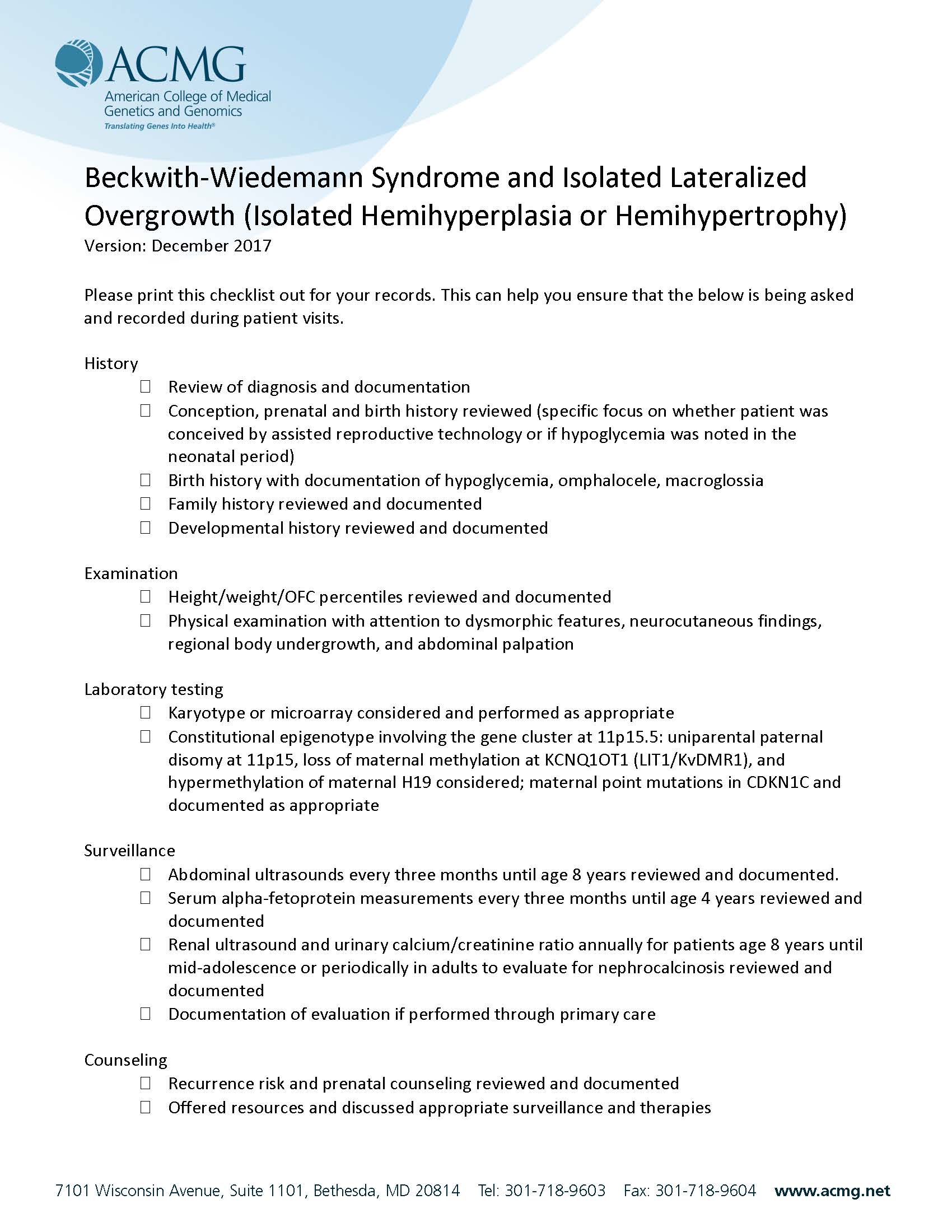Beckwith-Wiedemann Syndrome and Isolated Lateralized Overgrowth (Isolated Hemihyperplasia or Hemihypertrophy)
Version: December 2017
This module is for geneticists who are involved in the diagnosis, counseling and management of patients with Beckwith-Wiedemann Syndrome and Isolated Lateralized Overgrowth (Isolated Hemihyperplasia or Hemihypertrophy). This module is geared toward the initial evaluation and management of patients with Beckwith-Wiedemann Syndrome and Isolated Lateralized Overgrowth, not for the evaluation of whether Beckwith-Wiedemann Syndrome and Isolated Lateralized Overgrowth is in the differential.
Description:
The care of children with Beckwith-Wiedemann Syndrome and Isolated Lateralized Overgrowth (also known as Isolated Hemihyperplasia or Hemihypertrophy) centers around the fact that both are cancer syndromes that require ongoing longitudinal monitoring plan to catch kidney and liver malignancies early.
Learning Objectives:
At the conclusion of this module, participants should be able to:
- Document and ensure the provision of a monitoring plan that includes abdominal and renal ultrasound in the management of Beckwith-Wiedemann Syndrome and Lateralized Overgrowth Syndrome.
- Document and ensure the provision of a monitoring plan that measures alpha-fetoprotein levels in patients with Beckwith-Wiedemann Syndrome and Lateralized Overgrowth Syndrome.
- Provide counseling to patients and their families regarding the risk of Wilms Tumor and Hepatoblastoma in these conditions.
Scroll to the bottom of this page for a Preview of the Checklist.
Practice Performance Modules (CCP Part IV)
(Continuing Certification Program was formerly the Maintenance of Certification Program (MOC)
Practice performance modules are derived from accepted practice guidelines related to genetics patient care. Modules are available for pediatric genetics, adult genetics and prenatal/obstetric genetic care providers.
Process:
- Educational Content – Review module, literature, and practice checklist
- Charting – Each module requires the learner to review up to 5 patient charts and documenting certain findings according to the module questions.
- Assessment and Self-reflection Questions (N/A responses are not acceptable and credits will be revoked)
- Evaluation
Completion of these modules should be based on actual patient care as documented in your patient chart. The process is not meant to be punitive but designed to help assess practice and facilitate practice improvement. The modules should be completed honestly based on documentation in the chart. An audit process may be implemented by ACMG to document compliance. Learners should keep track of the specific charts used to complete the practice module so that these charts could be reproduced in the setting of an audit.
Self-reflections should be meaningful and provide evidence that the diplomate has considered the practice guidelines contained in the exercise in the context of their own clinical practice. Answers to reflection questions should be 2-3 full sentences long and have thoughtful content. Answers to reflection questions will be anonymized and reviewed for content by the MOC committee. Reflections that do not meet these guidelines will be returned to the diplomate for revision. Revisions that do not meet guidelines may result in forfeiture of MOC credit for a given module and a request to repeat the module.
- Do you think this module reflects best practice? Please elaborate whether you agree or disagree and state why.
- Did you identify any gaps in your practice? If so, please elaborate.
- If you identified gaps in your practice, what changes do you plan make to your practice based on this module?
- What if any barriers do you foresee for implementing change if you identified gaps in your practice? For example, short staffing, time factors etc.
